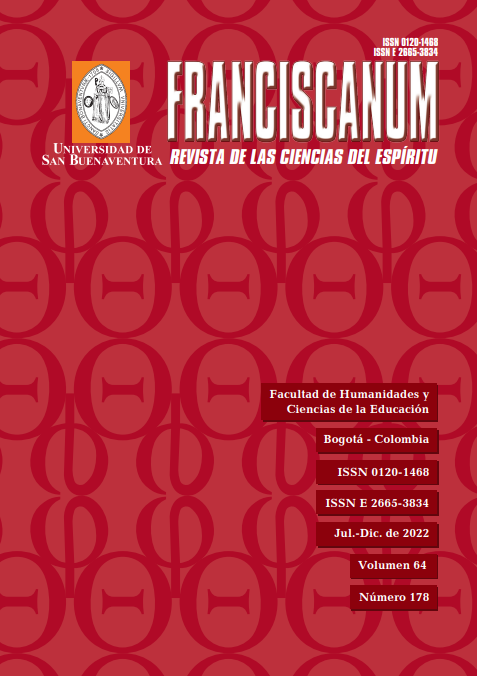This journal provides immediate open access to its content, based on the principle that giving the public free access to research helps a greater global exchange of knowledge.
Therefore, the Creative Commons 4.0 Attribution Attribution - Equal Share (by-sa) License is accepted: The commercial use of the work and the possible derived works is permitted, the distribution of which must be done with a license equal to that regulates the original work.
http://creativecommons.org/licenses/by-sa/4.0/
Along these same lines and in line with the Open Access policy, it is clarified that the authors maintain their rights to articles, without restrictions and, in the same way, they maintain their publication rights, without restrictions. They are only asked to reference the number of the Franciscanum magazine where the article initially appeared.
Abstract
This article is dedicated to the concept of conscience, or rather, the call of conscience, as outlined by Heidegger in the second section of Being and Time. While showing itself as an insurmountable concept for understanding the authenticity condition of the Dasein, the discussion about consciousness also establishes Heidegger’s relationship with the phenomenological tradition in a more comprehensive way, as a rupture of an interpretative flow and sedimentation of a new meaning. The notion of forgetfulness here no longer applies to the problem of the history of metaphysics in relation to the fundamental question of being, but to the self-understanding of Dasein as an entity open to a finite temporality, since in the enterprises inherent in everyday life, this entity degenerates in impersonality – through which inauthenticity is established. Here, then, is the interpretive horizon in which the problem of consciousness in Being and Time is established, which comprises one of the main sources for the approach of the theme in Martin Heidegger’s thought.
References
Casanova, Marco Antonio. Compreender Heidegger. 5.ed. Petrópolis, RJ: Vozes, 2015.
Costa, Vicenzo. Heidegger. Tradução de Yvone Maria de Campos Teixeira da Silva. São Paulo: Ideias & Letras, 2015.
Gorner, Paul. Ser e tempo. Uma chave de leitura. Tradução de Marco Antonio Casanova. Petrópolis, RJ: Vozes, 2017.
Heidegger, Martin. Beiträge zur Philosophie (Vom Ereignis). Frankfurt am Main: Vittorio Klostermann, 2003. (GA 65)
Heidegger, Martin. «Brief über den humanismus». En Wegmarken. Frankfurt am Main: Vittorio Klostermann, 1976. (GA 9)
Heidegger, Martin. «Das Ende der Philosophie und die Aufgabe des Denkens». En Zur Sache des Denkens. Frankfurt am Main: Vittorio Klostermann, 2007. (GA 14)
Heidegger, Martin. «Mein Weg in die Phänomenologie». En Zur Sache des Denkens. Frankfurt am Main: Vittorio Klostermann, 2007. (GA 14)
Heidegger, Martin. Phänomenologie des religiösen Lebens. Frankfurt am Main: Vittorio Klostermann, 1995. (GA 60)
Heidegger, Martin. Sein und Zeit. Frankfurt am Main: Vittorio Klostermann, 1977. (GA 2)
Husserl, Edmund. Cartesianische Meditationen und Pariser Vorträge. Auf grund des nachlasses veröffentlicht vom Husserl-Archiv (Louvain) unter leitung vom H. L. van Breda. Martinus Nijhoff, 1973. (Hua I)
Kahlmeyer-Mertens, Roberto S. 10 lições sobre Heidegger. Petrópolis, RJ: Vozes, 2015.
Kierkegaard, Søren Aabye. O Conceito de Angústia. Tradução de Álvaro L. M. Valls. Petrópolis: Vozes; São Paulo: Editora Universidade São Francisco, 2010.
Marion, Jean-Luc. «L’interloqué». En Topoi 2, Vol. 7 (1988): 175-180. Tradução de José Reinaldo F. Martins Filho. «O interpelado». Griot – Revista de Filosofia 2, Vol. 2 (2010): 119-128.
Martins Filho, José Reinaldo Felipe. «Heidegger leitor de Husserl. Sob a sombra da fenomenologia». En Prometeus. Filosofia em Revista 28, Vol. 11 (2018): 105-117.
Martins Filho, José Reinaldo Felipe. «O entendimento reflexionante apoderou-se da filosofia. Elementos da crítica hegeliana a Kant». En Sapere Aude. Revista de Filosofia 20, Vol 10 (2019): 681-701. DOI: https://doi.org/10.5752/P.2177-6342.2019v10n20p681-701.
Martins Filho, José Reinaldo Felipe. «Martin Heidegger et Edith Stein: Deux voies pour l’être. Impressions de proximité et d’éloignemen». En Heidegger Studien Vol 36 (2020): 187-213.
Martins Filho, José Reinaldo Felipe. Heidegger. Da analítica existencial à filosofia da interpelação. Goiânia: Universidade Federal de Goiás, 2021.
Nietzsche, Friedrich. Genealogia da Moral. Tradução de Paulo César de Souza. São Paulo: Companhia das Letras, 1999.
Stein, Edith. Endliches und ewiges Sein. Versuch eines Aufstiegs zum Sinn des Seins. Anhang: Martin Heideggers Existenzphilosophie – Die Seelenburg, eingeführt und bearbeitet v. A.U. Müller. Freiburg-Basel-Wien: Herder, 2006. ESGA, 11-12.

 Perfil Google Scholar
Perfil Google Scholar


















